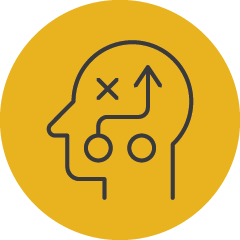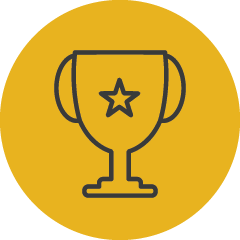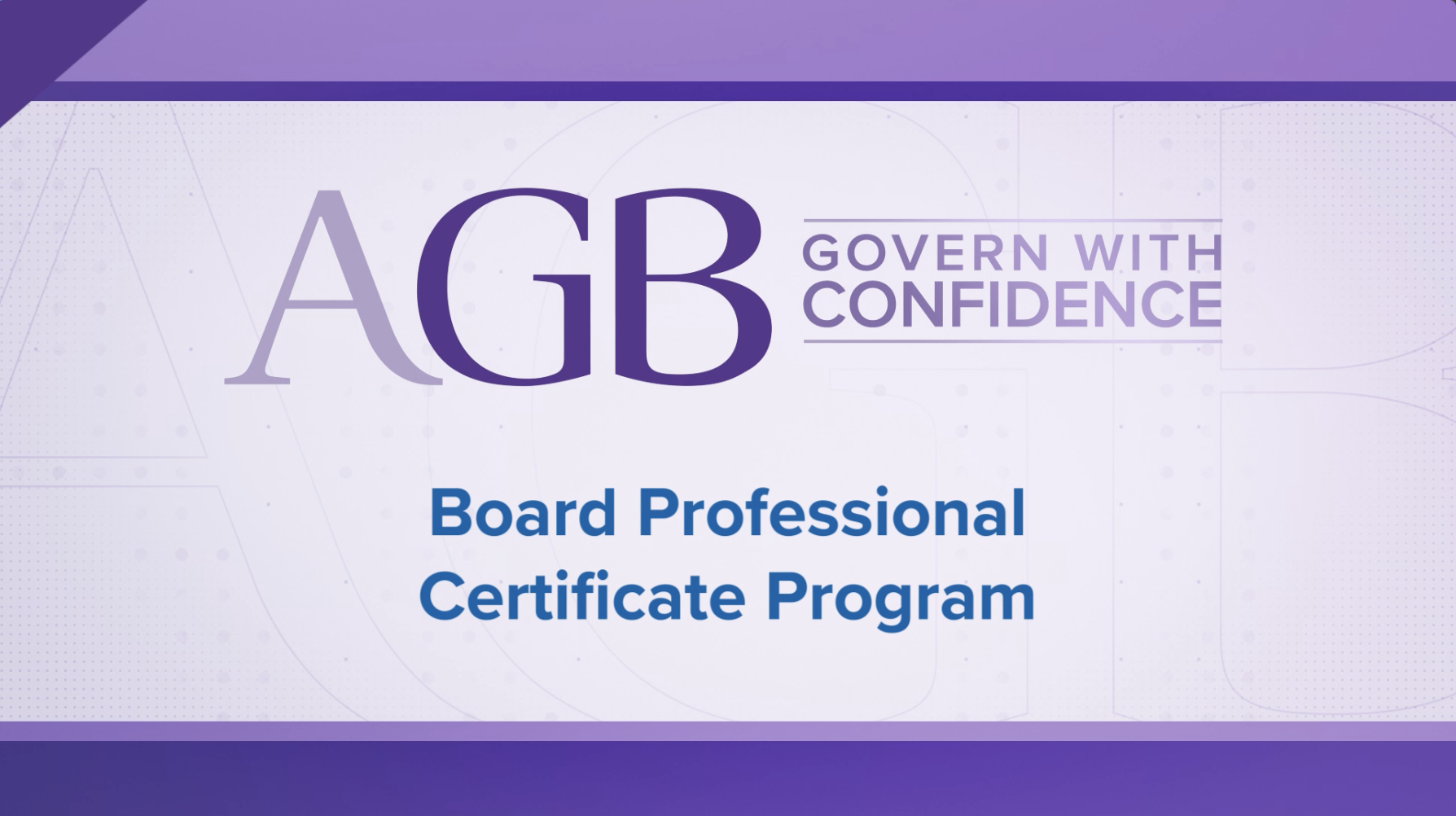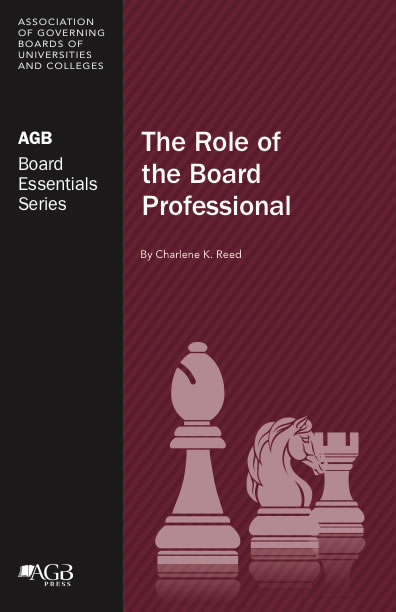Enhance your professional impact.
Board professionals’ expertise and knowledge are essential for consequential boards to achieve excellence. Effective, strategic governing boards are more engaged than ever before, and this level of engagement requires greater leadership and support from staff. AGB has developed the Board Professional Certificate ProgramTM for those who want to take the next step in their own learning and in supporting their institution, system, or foundation board. The curriculum is based on more than 100 years of research, best practices, and thought leadership.
This self-paced, online program is designed to review the fundamentals of the profession and help further your career. The curriculum includes 10 hours of coursework, plus additional enrichment and networking opportunities. Those who complete the program will be awarded a digital certificate that demonstrates a commitment to professional development and ongoing learning and will be offered the opportunity to connect with an experienced mentor to help them excel in their role.
Download an overview of the Board Professional Certificate Program.
The Board Professional Certificate ProgramTM is exclusively available to AGB members and is included with membership.
Invest in tangible outcomes.
Board professionals’ career pathways are based upon previous educational and professional experiences that have led them to their roles. No academic degree exists for individuals desiring to learn the essentials of the profession. By creating a widely accessible, comprehensive online program backed by extensive resources and expertise, AGB seeks to elevate the board professional role and demonstrate its importance to exemplary board governance.
By participating in this program, you will:

Enhance your knowledge
of your fundamental roles and responsibilities

Prepare to advance
in the profession by growing your competencies

Showcase your achievements
within your professional network with a digital certificate
Developed for board professionals by board professionals.
The Board Professional Certificate ProgramTM was designed by a team of board professionals, subject matter experts, and executive leaders within AGB. It reviews the basics of the profession and helps further your career. Each of the 10 lessons is structured to be completed within approximately 60 to 75 minutes depending upon how long you choose to engage with the activities and learning materials. You must complete all lessons to finish the program.
Each lesson will contain supplemental materials for viewing, reading, or listening to deepen the learner’s understanding. Most of these materials are found in AGB’s Knowledge Center.
Outside of the modules themselves, there will be regularly scheduled virtual roundtable opportunities for board professionals to connect, discuss the content, and get insight and advice from their peers.
Prerequisites
All participants in this certificate course are expected to read and refer to AGB’s The Role of the Board Professional by Char Reed, PhD. As a participant, you will receive a complimentary hard copy of this publication for your use before, during, and after completing the course. Prior to moving to Lesson One, you will be assessed on a few key principles from the publication.
Lesson One: Laying the Foundation for our Work
This lesson is intended to set the stage for the certificate program by defining the board professional role and diving into its complexities, requisites, and rewards. Commonalities and differences in the role among institutional types and sectors will be explored. This lesson will also cover:
- Staying current and adding value
- Developing advanced communication skills
- Thinking strategically
- Navigating complex relationships and dynamics
The lesson will conclude with a brief learning assessment quiz and completion of a goal-setting exercise that the learner will build upon throughout the lessons to come.
Facilitator:
Char Reed, PhD
Vice President and University Secretary, Kent State University
Lesson Two: Core Functions of the Role
This lesson will provide learners with an operational framework for the foundational aspects of the role of the board professional. Information on the transactional elements of the board professional’s responsibility will be explored and expectations for appropriate execution will be identified. These professionals help to ensure that board members are prepared to govern by facilitating their work and providing them with the tools and the environment necessary to succeed. Topics for exploration include:
- Planning and executing the business of the board
- Strategic meeting materials
- Meeting logistics and structure
- Board member orientation and continued development
- The use of technology
- Communication
- Institutional finances
Facilitator:
Heather Fehn
Chief of Staff and Secretary to the Board of Trustees, The College of New Jersey
Lesson Three: The Effective Board Professional and the Board and Institution Leadership
This lesson will present an overview of the basic building blocks for a successful board professional. It will address the fundamental characteristics of a successful board professional within their institution or foundation.
Facilitator:
David Fine
General Counsel & Board Secretary, Metropolitan State University of Denver
Lesson Four: The Board Professional as a Colleague/Bridge with the Leadership Team
The board professional must serve as a “bridge” between the board and colleagues. Learners will hear from experts on how to effectively communicate the goals of the board to the leadership team and how the board professional can facilitate conversations between the board and the leadership team to successfully execute the goals of the board. The lesson will conclude with a brief learning assessment quiz and completion of a goal-setting exercise the learner will build upon throughout the lessons to come.
Facilitator:
Amelia Arnold
Board and Council Administrator, Saint Louis University
Lesson Five: Legal Components of the Work of the Board Professional
In today’s complex environment, it is imperative that boards and board professionals have the knowledge and resources to do their work effectively and in accordance with the law. This lesson will focus on key legal issues and considerations most relevant to the responsibilities, policies, and operations of the board. It will offer guidance to board professionals in managing the work of the board and working collectively with the board, president, and legal counsel to increase effectiveness and reduce potential risks and liabilities. From various perspectives, advice will be given on ways in which board professionals can increase collaboration with their counsel. If they serve as both general counsel and board professional, advice will focus on helping them thrive in the dual role.
Topics that will be addressed include:
- Charters and bylaws
- Compliance and ethics
- Special considerations for different institutional sectors (public, private, foundation, and system)
The lesson will conclude with a brief learning assessment quiz and completion of a check-in activity.
Facilitator:
Char Reed
Vice President and University Secretary, Kent State University
Lesson Six: Board Composition and Board Member Selection
While there are significant differences in how and to what extent boards, particularly those of public institutions, can control the identification and recruitment of new board members, all boards and board professionals should be as attentive and influential as possible in this process.
At most institutions, a committee on trusteeship or governance plays a vital role in how the board is perpetuated—identifying, recruiting, and selecting new trustees; assessing their performance, collectively and individually; and identifying the competencies needed in future members and leaders. It is vital for board professionals to understand the importance of the governance committee/committee on trusteeship and work actively to optimize its impact in identifying the long- and short-term needs of the board and selecting those whose talents, time, and often financial resources are essential to the board’s effectiveness.
In this lesson, board professionals will learn more about the principles of trusteeship, what steps they can take to assist their boards in recruiting potential board members to fill needs through a skills inventory, and ultimately, the identification of qualified candidates to fill current and future seats on their board. Examples of board composition matrices and other resources will be presented for learners to use.
Facilitator:
Amelia Arnold
Board and Council Administrator, Saint Louis University
Lesson Seven: Board, Board Member, and Presidential Evaluation and Assessments
Most accrediting bodies expect colleges and universities to assess the board, and they include this expectation in their standards. Assessments can help the board examine its leadership pipeline for board officers, and the talents, skills, and backgrounds needed in board composition. Board assessments, as well as presidential assessments, are essential elements of good governance and are recommended for public institutions/systems, independent institutions, and foundations.
By establishing a thorough assessment process and clear plans to address findings, boards hold themselves and their presidents accountable, demonstrate commitment to serve their institution/foundation, and promote stronger presidential and board performance. The board professional often acts as a strategic advisor during the assessment and performs duties such as organizing the process, bringing helpful resources to the board’s attention, scheduling meetings, and communicating with participants.
This lesson is intended to guide learners in understanding the important role of board and presidential assessments in achieving exemplary board governance.
Facilitator:
Lynnette Heard
Senior Fellow and Senior Consultant, AGB
Lesson Eight: Presidential/Chancellor Search and Transition
The responsibility of selecting a president is one role boards often face. Recent data suggest that they will need to face it more and more frequently. Today’s presidents are older, but they are serving notably shorter tenures. The average length of presidential tenures is on the decline. In 2017, presidents spent an average of 6.5 years in their jobs, down from 8.5 years in 2006.
Few moments have more consequence to a college or university than the selection of a new president. More than other leaders, a president comes to personify an institution and shape its future. A president must provide leadership in maintaining and strengthening academic integrity and reputation. Board professionals play an essential role in the presidential search and transition, including serving as an in-house strategist and day-to-day expert; the “glue” that connects the board, the search committee, the search firm, the institution, and the candidates; planner, coordinator, record keeper, and logistics manager; and more.
In this lesson, learners will understand these key roles and available resources, and will be guided by experts on this subject.
Facilitator:
Char Reed, PhD
Vice President and University Secretary, Kent State University
Lesson Nine: The Board Professional’s Role in Promoting the Board's Role
To aid internal and external communities in understanding the work of their boards, board professionals are an essential partner. Learners will hear from experts on what shared governance is and how a board professional can instill shared governance at their institution.
Learners also will gain insight on how board professionals engage and promote the board through campus engagement, strategic planning, and institutional budgeting. Finally, they will understand the role of the board related to governmental bodies—local, state, and federal.
To conclude this lesson, a brief learning assessment quiz and completion of a goal-setting exercise will be offered and will invite learners to draw on real-life examples from their own institutions.
Facilitator:
Amelia Arnold
Board and Council Administrator, Saint Louis University
Lesson 10: Ongoing Professional Development—Career Ladders, Mentorship, and Support
As board professionals navigate their careers, this lesson will guide participants through the exploration of professional development opportunities beyond the context of this certificate program and their current responsibilities. Information regarding the value of mentorship, networking (including the BP Community), and building transferrable skills will be explored.
Key to the success of a board professional is an understanding of the resources available through AGB. This lesson will help to facilitate the matching of these resources to board and institutional needs.
Finally, learners will be presented with complementary training and professional development experiences and opportunities outside of AGB and the traditional role of the board professional.
Facilitator:
Heather Fehn
Chief of Staff and Secretary to the Board of Trustees, The College of New Jersey



